This post has not been edited by the GamesBeat staff. Opinions by GamesBeat community writers do not necessarily reflect those of the staff.
EA really wanted to capitalize on the success of Origins, so the game was really being pushed hard to be released now. Inon Zur
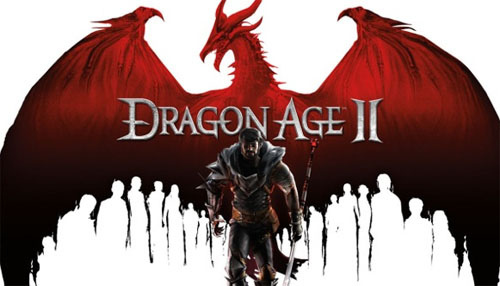
With the release of Mass Effect 2, Bioware found success in a streamlined, action-oriented RPG with an episodic story. Following this success, they attempted a similar feat with Dragon Age II, turning the Baldur’s Gate successor into a sort of a hack-n-slash title with faster combat, a streamlined equipment system, and ME2’s conversation wheel. After putting in a total of 90 hours across 2 playthroughs as a warrior and mage I don’t believe the ME2 approach worked entirely in DA2s favor. Though delivering compelling characters, and slightly better combat, DA2 lacks the original’s epic story, and the rush job is apparent in almost every aspect of the game.
The Warden, The Champion, and the story so far
Dragon Age II begins shortly after the events at Ostagar in Dragon Age: Origins with the Hawke family fleeing the destruction of Lothering. However, after this opening, the links between DA2 and DA:O are tenuous at best. Transfering my save from DA:O, I found that some of the Warden’s major decisions were referenced in conversations, while others come into play in the form of a short sidequest, but none of those decisions affect the game or story in any significant way.
On the other hand, the little touches do help to flesh out the world of Thedas. For example, Hawke’s mother’s maiden name was Amell, which happens to be the last name of the Warden if you chose a human mage. Similarly, Merril appeared in the Warden’s origin if your Warden was a Dalish elf. While not significant to gameplay, these touches further Bioware’s assertion that Thedas is a world shaped by player agency.
The Makings of a Champion
Beginning DA2, one of the most significant decisions is which class you choose to play as, as your class determines which family member will accompany Hawke throughout the rest of the game, with mages getting Carver, while warriors and rogues get Bethany. Also affecting Hawke’s family, and slightly addressing one of my complaints with DA:O, is skin tone. I was able to get Hawke’s family to change both skin tone and hairstyle when I chose the darkest skin tone. They still aren’t black, but it’s a step in the right direction.
Like every Bioware game, there is a lot of conversing to be done in DA2, and taking a not from the ME2 playbook, DA2 employs the conversation wheel. Like ME2, the conversation wheel selects the tone of Hawke’s response (diplomatic, sarcastic, or aggressive) without explicitly telling the player what Hawke is going to say. Also, Hawke’s personality changes by consistently choosing one tone over the others, as well as unlocking special dialogue options in some cases. For example, playing as a warrior Hawke, I used the diplomatic tone throughout most of the game, and during one sidequest, I was presented with a special diplomatic option to rally the troops. Playing again as a sarcastic mage, I wasn’t presented with this option. In fact, I don’t remember being presented with any special conversation options as sarcastic Hawke.
Friendship and Rivalries
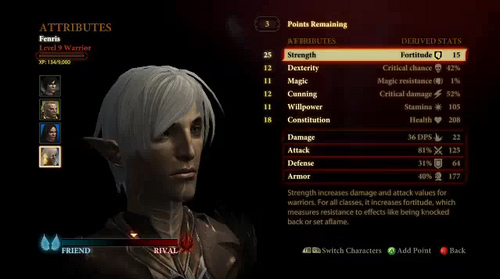
I didn't really care for the emo-elf
The characters that accompany Hawke are a fascinating, unique bunch, and it can be fun to switch around your party to see what they will say to each other while Hawke runs around Kirkwall. Some of the conversation, especially the ones with Isabela, can be especially funny.
The approval system from DA:O returns, but altered in DA2, as Hawke’s companions can gain either friendship or rivalry points based on Hawke’s decisions. However, you don’t need to make friends with your companions, as there are bonuses for both friendship and rivalry, and romance can be pursued from both paths. Also, maxing out a companion’s friendship or rivalry locks it in place, so they can no longer be mathematically swayed by Hawke’s decisions, though they may still vocalize their descent.
Maxing out friendship proves easy enough, as most companions respond well to the diplomatic tone. On my second playthrough, I decided to go the opposite way and go the rivalry route with all of the characters, but I found it difficult to pursue rivalries with Hawke’s companions, and it wasn’t because it was hard to do so. As a testament to Bioware’s incredible writing, I was so enamored with most of Hawke’s companions that I couldn’t bring myself to say the mean things I had to in order to in order to push the rivalry forward. During a conversation with Merril, I felt so bad after taking the aggressive stance (and sort of being a dick to her) that I had to reload a previous save and abandon my plans to rival everyone. However, I had no qualms rivaling Anders and the emo-elf.
A Story in Three Acts
In a bit of a departure from the Bioware formula, the story in DA2 begins after the events in the game, as Varric frames the plot of DA2, recounting the Champion’s tale to a Chantry seeker. Taking place in and around the city of Kirkwall, the DA2 story spans three acts spread out over 10 years. Although each act leads into the next, the story never reaches the epic scale of the original, as the fragmented nature of DA2’s plot prevent it from coming together in any significant way. While it is refreshing for an RPG in fantasy setting to sport a plot that doesn’t involve saving the world, without that big bad looming in the background, the plot loses its focus, with each act becoming stand-alone episodes, and after two climaxes, the third doesn’t exactly rise to the occasion.
Simplified…to a point
In an attempt to streamline the game, DA2 applies a simplified inventory system that while trying to cater to a larger audience and still giving the seasoned vets the customization they crave, ultimately becomes frustrating because of odd decisions on Bioware’s part.
Although companion armor cannot be changed, their accessories and weapons can be, but it doesn’t help when you find a bunch of items that all have the same generic names (such as Sword, Belt, or Ring) while featuring completely different stats.
Also, the way Bioware set up some of DA2’s stats can be a bit confusing at first. For example, there are separate stats for attack and dps, as well as armor and defense. At first glance, these stats seem to indicate the same thing, but in actuality, attack is accuracy, and defense is dodge rate. By not clearly naming these stats, Bioware needlessly complicated a fairly straightforward system.
Flawed by design
Based on the politics, the conflicts, and events that unfold, it seems as if Bioware was intent on making the city of Kirkwall a character in itself. Unfortunately, for all intents and purposes, Kirkwall is a dead city. It comes off as intensely quite, with only a few NPCs here and there that do little more than stand in a doorway. In fact, there are a few NPCs you will see in Act One doing the exact same thing six years later in Act Three.
Exploration in DA2 is tedious at best, because you will be exploring the same few recycled environments over the course of sixty hours. Sure, a door may be locked, or some rocks block your path, or you might even run a dungeon backwards, but it’s the same dungeon. Houses work the same way. In fact, I think there is only one map for houses.
Combat and Tactics
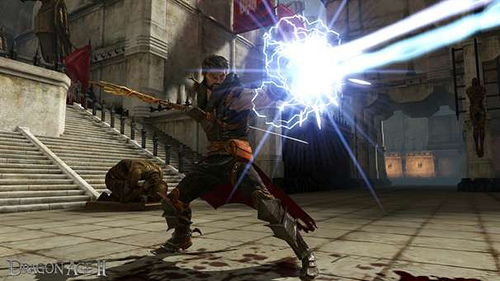
Though combat is faster in DA2 than it was in Origins, it isn’t altogether different. Skills are still mapped to the face buttons, and combat can still be paused with the left trigger, so the only discernable difference is that you will have to hit the A button to attack. A lot. In fact, enemies will jump out of the bushes, over 3 story buildings, and come up out of the ground, just so that they can line up and die.
The tactics system also returns with some upgrades. Each character has 20 slots, and no longer need a skill to unlock more slots. There are also new conditions, such as the one that allows healers to revive dead party members (something DA:O lacked). However, everything isn’t sugar and rainbows, as reviving dead companions in the middle of a battle seems to turn off their tactics. In fact, after reviving a character, I have witnessed them walk around the room before they decide to attack, and when they do attack, they refuse to revert to their preset tactics with until I take control of them for a bit.
The tactics faux pas isn’t the only problem with the combat in DA2. Playing as a warrior, fighting was easy enough, as I was always at the forefront, rushing to attack each enemy that spawned. Playing as a mage however, I found a significant flaw in the combat system. Hawke can only attack enemies that he/she has locked onto (as indicated by the crossed swords icon above next to the enemy’s name), but casting an area of effect spell that does no damage removes that target lock, leaving me mashing on the A button with no effect. It’s a disorienting flaw that can leave you dead, especially in a certain duel later in the game.
Glitches Galore
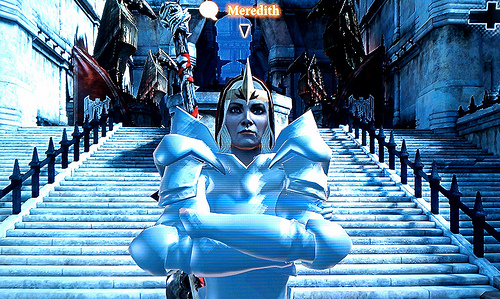
This is Meredith. She didn't feel like loading her textures today.
At the start of Act 3, I visited Merril at her house, because I had a quest to do so. When the conversation began, she started talking about events that hadn’t happened. Initially, I thought that something happened between Act 2 and 3, but soon I began to realize, the game presented a conversation out of order. Essentially, the game I was playing spoiled the game I was playing.
This isn’t the only major glitch in the game. In fact, there are quite a few, ranging from near game ending friendship bonus glitches, to quests that cannot be completed.
Dragon Age II is plagued with so many bugs that it almost seems as if the game were still in beta. I understand that no game is perfect, and I wouldn’t mind if the only problems were an XP glitch here, or an infinite armor glitch there, but there are so many bugs that it is impossible to complete a playthrough without encountering any.
Clipping, and other oddities
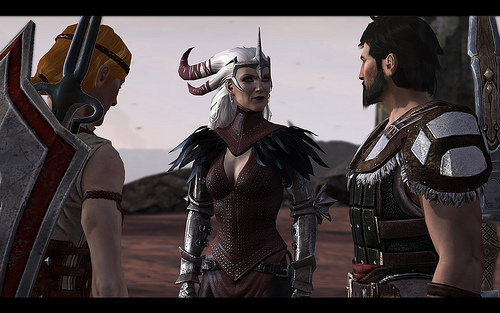
So, who decided to Flemeth the face of a 60-year-old and the body of a 20-year-old?
For me, nothing kills immersion like clipping, and in DA2, everything clips. Aveline’s hair clips through her armor, a mage’s staff clips through their legs when running, hell, the Arishok's giant should pauldrons go right through his neck at one point. During a close-up. Why outfit a character with an item that will go through his face when he raises his arms?
Speaking of the Arishok, listening to conversations between him and Hawke can be quite intriguing. Watching the conversations between Hawke and the Arishok reveal the poor quality of Bioware’s animations. During conversations, the Arishok continuously gestures with his hands, and even points at someone, all without actually moving his hands. This isn’t the only animation issue, as no one in any Bioware game seems able to touch another character without going all wonky.
I would also like to ask Bioware, who thought that collecting junk was fun? Let me assure you, its not. It’s not fun to open a locked chest only to get a piece of junk work 3 coppers. It’s not fun when I find a sparkly pile of treasure that looks like a pile of gold coins, and all I get is broken gem. Also, it’s just plain weird that the Champion of Kirkwall is running around tearing the trousers off of corpses. (Seriously, you get torn trousers from corpses.)
Finally, one of the oddest things I found in DA2 was Fenris’ mansion. Inhabited by Fenris in Act 1, there are dead people lying around in almost every room. In fact, six years later in Act 3, not only are those dead people still there, but they also haven’t decomposed at all. For some reason, they were created as part of the background.
And there still aren’t any horses in Thedas.
Conclusion
Dragon Age II isn’t a terrible game, it just isn’t a terribly good game. The rushed production time is noticeable in almost every facet of the game, from glitches (both major and minor), to recycled environments, and other general oddities. However, for all of its faults, there is still some fun to be had in DA2. Combat can sometimes be exciting and visceral (when it works right), and the characters are compelling and memorable. In the end, Dragon Age II isn’t so much about Hawke as it is about Thedas, and for that reason, DA2 is required playing for anyone invested in Thedas. For everyone else, the combat is decent and the characters are compelling, but they don’t make up for a meandering plot, dull overused environments, and a game that just isn’t finished.
